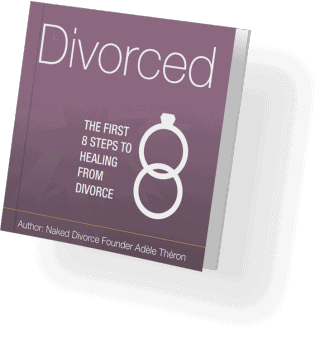
Free e-book: The First 8 Steps to healing from divorce

Rebound: To do, or not to do?
I’ve known people who have started dating almost immediately after divorce…
Others may enjoy what are known as ‘transitional sex partners’. These are usually people who become good friends and bed partners during the intervening period between divorce and falling in love again. The important thing is to be clear about the boundaries of these relationships. If this works for you, enjoy it and have fun. You’re an adult and you can make your own choices.
Note:
People should date after divorce. It is more complicated when you have children but you still need to nurture yourself as a human being and as a women. And that includes a love life.
We were not designed to be alone. But do maintain a balance; don’t introduce every man you date to your children.
Keep your love and home lives separate. You don’t want your home to be like Grand Central Station, with different men appearing and disappearing.
You’ll only confuse your children and impede they healing.
When you have established a committed relationship, introduce your new partner gently. Give your children time to get used to him.
Remember, every day of your children’s lives is a day of your life too.
Ask yourself:
To be clear on the nature of your new relationship, ask yourself…
- How soon did I get involved with this person after my marriage breakdown?
- How do I really feel about this person?
- Am I really interested in them or are they a distraction?
- Have I changed in order to attract this person into my life? Am I being myself?
- Am I still thinking about my ex and my former relationship?
Beware of rescuers
As we live, work and move we’re projecting an image and expressing energy all the time. Our sense of self and our energy change, constantly reflecting what we’re dealing with and experiencing in our lives.
When we’re passionate and creative and we’re making choices and decisions that match our life’s purpose and values, we project self-confidence, enthusiasm, joy and vibrancy towards life.
Conversely, while we’re healing from divorce, the image and energy we project may well mirror a more dependent and fragile person who expresses less joy, passion and enthusiasm than we otherwise would.
The people you meet while you’re in a ‘compromised’ state may well be attracted to your vulnerability and that part of you that is needy and wanting to be comforted and cared for. This is a danger zone for relationships.
As you heal from the grief and loss precipitated by divorce and you begin to regain your personal strength, passion and joie de vive, the man who ‘signed up’ to take care of you may wind up feeling jealous, confused, and threatened by your ‘new’ independence. Within day 13 of the Naked Divorce book – we discuss the Drama Triangle and it’s impact so be wary of attracting rescuers during your time of healing.
Recovering from loss and heartache is an inside job. It is important to stay mindful of how you think, feel and respond to people and situations.
Become a good observer of yourself. Notice new attitudes, thoughts, feelings or beliefs that might be emerging. Have you learnt anything you’d like to integrate into your worldview or your way of being in the world? With friends and family? At work? In another love relationship?
Don’t attach yourself to any new acquaintances or friends who see you as less than you are.
The characteristics of a healthy relationship?
Honesty and trust
- Giving real compliments
- Discussing problems
- Using ‘I’ messages to share feelings
- Asking for what we want, not expecting they owe it to us
- Admitting mistakes
- Asking (not accusing) each other about rumours
Emotional respect
- Disagreeing without put-downs or threats
- Respecting their right to be safe and to control their own body and decisions
- Trying to understand their feelings, even if we disagree with their ideas
- Caring to find out their point-of-view
Listening
- Asking what they think and how they feel
- Empathising by putting ourselves in their shoes; guessing what they feel
- Saying what we think we heard to check for understanding
- Asking what is important to them
Freedom and encouragement
- We have the right to our own, and support each other’s rights to have, opinions, feelings, space, activities, friends and dreams
- Expressing fears, instead of claiming ownership, when jealous
- Either person can decide to break up
Sharing activities
- Hanging out together sometimes
- Doing things each person enjoys
- Encouraging each other’s enjoyment and success
- Learning from each other
Kindness
- Helping each other (while respecting our own limits)
- Giving gifts sincerely, not to get something back; the thought, not the money counts
- Showing our care through consistent respect (not abuse followed by apologies)
Mutual affection
- Telling things that we like and appreciate about each other
- Each decides if, how, and when we want to be to touched; checking to ensure affection is mutual
- Respecting each other’s values, property, bodies, space and limits; stopping if one says ‘No’
Shared decision-making
- Deciding things together, not ordering
- Negotiating differences
- Splitting costs fairly
- Searching for win-win solutions
- Whoever pays, no one owes anyone kisses, touching, or anything else
If you enjoyed this post, I’d be very grateful if you’d help it spread by emailing it to a friend, or sharing it on Twitter or Facebook.
With you in service

 Book a Clarity Call for any divorce or break up support you need,
Book a Clarity Call for any divorce or break up support you need,

